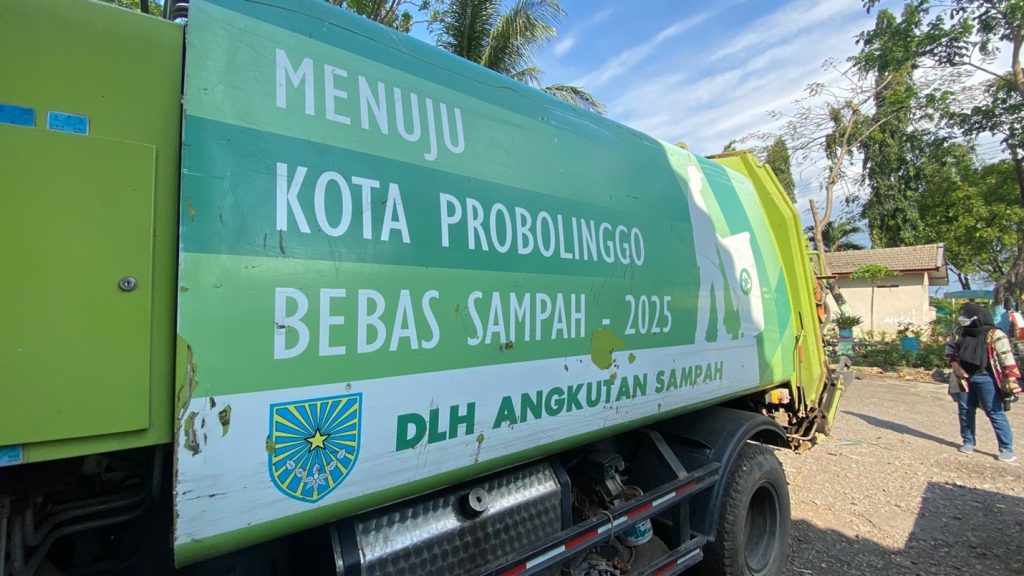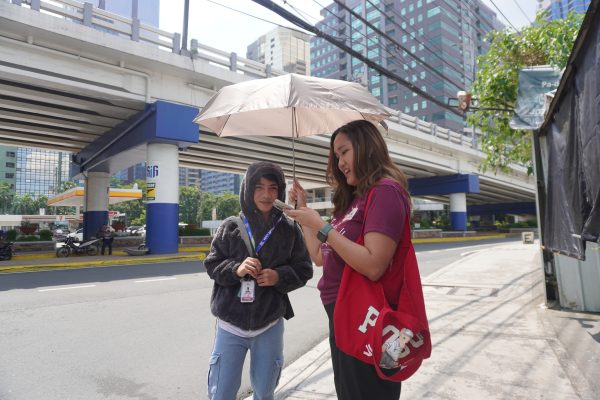Probolinggo is the global and regional winner of the 2022 We Love Cities campaign by WWF. This feat signifies the key role of its citizens not just in helping the city win international competitions, but more importantly, in driving climate actions from and off the ground.
Community-driven urban farming

A community vegetable garden in Climate Village RW 1 Pilang, Probolinggo City, Indonesia.
Ika Sulistyowati and the women of the Climate Village RW 01 Pilang, Kademagan Subdistrict, Probolinggo City, enjoy picking chilies in their community’s vegetable garden. Established in 2017, the garden also features eggplants, cauliflowers, and various hydroponic vegetables to help the community meets its daily nutritional needs.
The community members take turns in maintaining the garden during most of the week, with everyone banding together on Sundays to take care of the plants.
“Having this garden provides me with many benefits. My home’s vegetable needs can be met, as well as those of other communities. If anyone needs chilies or vegetables, they simply need to pick them from the garden,” said Ika.
Besides the vegetable garden, the community carries out other environmental activities, including a vegetable seedlings nursery, organic waste processing, waste banks, and water infiltration through biopore infiltration holes and infiltration wells.
“We process our organic waste into compost using biopore holes which also prevent flooding by allowing water to be better absorbed into the ground,” explained Ika.
Biopore infiltration holes also contribute to the reduction of organic waste. Various types of kitchen waste, such as fruit and vegetable scraps, may be placed inside the biopore infiltration holes in order to be converted into compost. Through this activity, it is possible to reduce the amount of waste that will end up in the soon-to-be-overloaded landfills. Moreover, by filling biopore holes with organic waste, people will be indirectly taught the importance of separating biodegradable from non-biodegradable wastes.
RW 01 Pilang Village is one of the seven Climate Villages (Proklim) in Probolinggo City. For its success in empowering community members and encouraging their active participation in climate and environmental management, the RW 01 Climate Village was awarded the 2020 Priority Climate Village Award by the Indonesian Ministry of Environment and Forestry.
The proklim is a national program managed by the Indonesia Ministry of Environment and Forestry designed to increase community participation in adaptation and mitigation actions in response to climate change.
Community-based inorganic waste management
Located in RW 03 Jebreng Wetan Village, Kedopok District, is another of Probolinggo’s Climate Villages. This particular Proklim’s flagship activities include rainwater harvesting and the management of inorganic waste through the Kenari Indah Waste Bank. The community itself created the Kenari Indah Waste Bank in 2014 in an effort to reduce waste.
“This waste bank plays a significant role in lessening the wastes arriving at the final waste disposal site (TPA). As a result of the waste bank, we currently have more than 200 clients, many of whom are community members,” explained Syaifudin, the Kenari Indah Waste Bank manager.
A sorting process is conducted to determine the value of garbage collected from the community.
“The waste bank’s profit comes from the value of the sorted waste and is used for operational costs. The remainder is profit, and these are distributed to the Kenari Indah waste bank staff during Ramadan,” said Syarifudin.
A part of the Kenari Indah Waste Bank’s mission is to educate the public about inorganic waste management at source to lessen the community’s overall waste generation.
“The management of waste is a shared responsibility. The community must participate in 3R efforts as well, such as reducing, reusing, and recycling waste,” Syarifudin concluded.
Probolinggo’s commitment to climate change

Written in Bahasa Indonesia on this Probolinggo garbage collection truck is “Probolinggo Waste-free 2025.”
These efforts to establish and sustain climate villages are part of the Probolinggo local government’s commitments to climate action.
In 2013, the Probolinggo Mayor issued Regulation Number 37 or the Regional Action Plan for Reducing Greenhouse Gas Emissions and Adapting to Climate Change. Through this regulation, Probolinggo has developed a wide range of mitigation and adaptation actions for climate change impacts, including transportation, energy, and waste management actions, as well as supporting policies and initiatives such as the Climate Village Program.
According to Rachmadeta Antariksa, Head of the Probolinggo Environmental Service, the Climate Village Program is one of the climate actions that directly affect the community.
“By the end of 2022, seven climate village areas in Probolinggo City have already been recognized, and they constitute a said Antariksa.
Antariksa also explained the implementation of other sustainable development innovations in Probolinggo City, including the development of educational tourism activities for the climate village program known as Sate Paklim. In addition, the city also has a Climate Change Adaptation-Mitigation Action program called Gerakan Arisan Perbanyak Biopori (Get-Together Biopores Movement).
“There are currently 474 biopore holes located throughout Probolinggo City’s waste banks. The waste banks consist of 81 groups, 26 schools, 132 individuals, and six agencies, including the Environment Agency,” said Antariksa.
Bestari final processing park
As a further symbol of the Probolinggo government’s commitment to sustainable development, it refers to its final disposal site (TPA) as the Bestari Final Processing Park (TPA Bestari). In this facility, waste from the Probolinggo community is collected and processed with the aim of being reused.
“At TPA Bestari, waste is managed using a sanitary landfill and layered waste collection system,” said Antariksa.
As with a park, people can comfortably walk through the TPA as it is free of foul odors despite the mountains of garbage visible on both sides of the landfill. This is possible by layering soil on top of wastes placed in the landfill area. The objective is to minimize the negative environmental impact caused by garbage such as odors, as well as to minimize the development of vector animals such as flies.
Through its Waste Management Unit, TPA Bestari provides a garbage pick-up service for organic wastes throughout the city. This activity is commonly referred to as Japanik (Organic Garbage Pick-Up).

Compost packaging by the Waste Management Unit of TPA Bestari.
“As long as a community has collected five bags of garbage, we will be able to take and process these into compost. In return for the wastes that we process, the community will receive 70% of the revenue. The community truly reaps many benefits from waste management at source,” explained Robiatul Adawiyah, Head of the Waste Management Unit at TPA Bestari.
Adawiyah explained that these organic wastes are converted not only into fertilizer but also into fuel that TPA employees use for cooking.
In addition, TPA Bestari provides methane gas to the surrounding communities. The methane gas is taken from the waste heap at the TPA and then pumped through a small pipe from the sorting station.
“Currently, nine families use methane gas as a source of cooking fuel,” added Adawiyah.
Probolinggo City does not charge its citizens for waste management activities. It recognizes that having a sustainable city is a responsibility that the local government owes to its citizens. In enabling citizen-driven waste management efforts, Probolinggo has also ensured that immediate, tangible benefits can be felt by communities thereby encouraging the sustainability and wider adoption of its climate actions.




